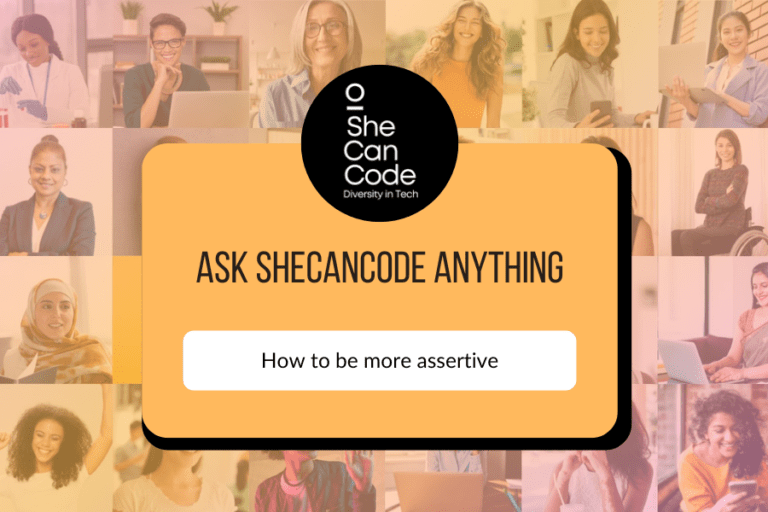
To help us answer these questions is coach, Fiona Hatton.
As a coach, Fiona supports women to live a happier life: through prioritising their wellbeing, doing more of what they love, and focusing on what really matters to them. She has worked with women who’ve gone on to change career, leave a toxic workplace, and make big life decisions about where (and how) they want to live.
Join the Yoco Studio community for free resources, useful tips and offers. Find out more about her coaching and yoga packages at http://www.yoco.studio.

If you have any questions for us – whether it be about work relationships, gaining confidence, or taking the leap into tech – you can ask us anything.
Hi,
Myself and a colleague are looking to start a Women in Tech group in our workplace.
We have not started one before but are still very passionate about the topic. What would you recommend in terms of structuring the group and setting a purpose?
Thanks,
New Networker
Hello New Networker,
How exciting! You’re so right to think of purpose and structure – by being focused you can help potential members know whether they want to join and you can make sure you’re not stretching yourself too thinly trying to cover everything.
I have a few questions to help you think about what you’d like to achieve through the group.
Who will be joining?
When you know more about future members, your group’s purpose will become clearer too. For example, if your members are likely to be women already working in tech careers, your group could have a very different focus to a network run for women wanting to make a career change.
Once you know who will be joining, ask them what they want from a group. This way you’ll be promoting your group and understanding what will encourage your future members to join.
What’s missing in your organisation?
Filling a gap will mean that you’re not competing against other groups and that you’re providing something that’s not already available. Take a look at what’s already on offer in your organisation, and perhaps think about what’s been useful for you in other places you’ve worked.
What shape will the group take?
Ideally, how often will you meet? What format will the meetings take? Circle back to your purpose to work out what would be most useful. For example, regular external speakers could be a great way to inspire your members (if inspiration is what you’re all about) or a book club or skills swap could help to boost learning.
And speak to your future members again. They’ll be giving up their time to come to your group – what would they like to get from it?
Once you’ve decided on a structure and format, take a look at the resources you currently have. Is what you’ve settled on realistic? What extra support do you need, and where could you get it?
How will you promote your group?
When you know who your members will be, this job is a whole lot easier. Think carefully about where they get their information, what sort of language they’ll respond to, and the kind of activities that will make them want to try out your group.
Consider how you’ll keep them coming back and encourage new people to join as your group gets established.
How will you know your group is a success?
Although the number of people coming to your group is a useful measure, there are other ways to check that you’re on the right track. This is where knowing your purpose is helpful. Whether you’re there to support professional development, sharing knowledge, or build a sense of community – how can you tell that what you’re doing is working?
If you discover that what you’re doing isn’t producing the outcome you imagined, don’t despair. This is a great opportunity to try a different approach, or even rethink your purpose. Learning what works and what could be done differently is so valuable.
You’re already starting off in a great position – thinking about purpose will absolutely help you to put together something really amazing. I’d love to hear how you get on!







